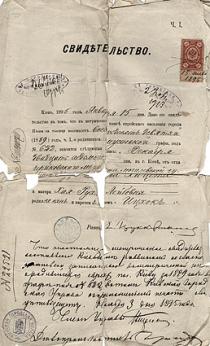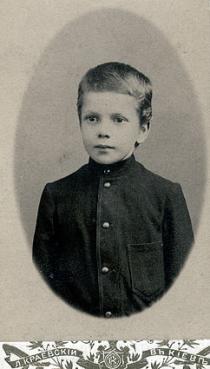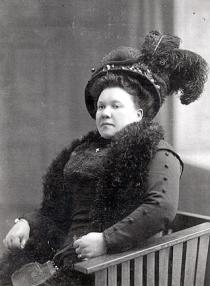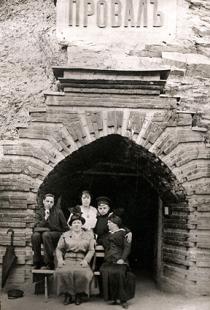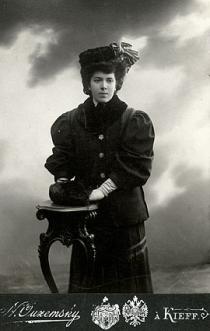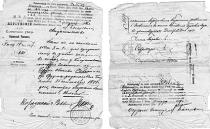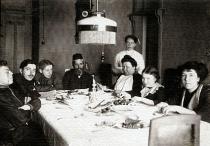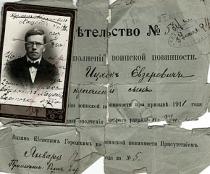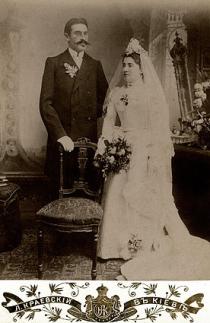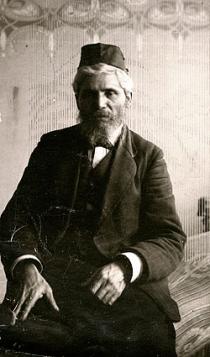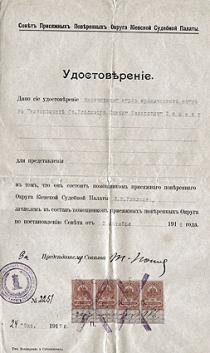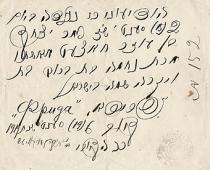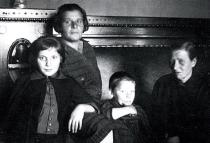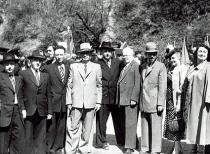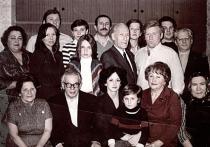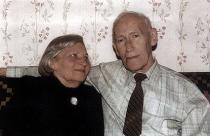My brother Leo Khatset took this photo of us in the dining room in our apartment on my father's birthday. We are waiting for my father to come home from work. From left to right: I, Frida Khatset; my mother Nehama Khatset; my brother Boris Khatset; our governess Olga that had a Freel school diploma. Kiev, 1931.
I was born on 2 September 1919. In 1921 my younger brother Boris was born. We lived in a 3-storied building. I remember our entrance to the building with a high front door and wide staircase with many stairs. We had a big apartment with high ceilings: a spacious dining room, my father's office and a smaller children's room with 3 beds in it. There was also my parents' bedroom, kitchen, toilet and a bathroom.
My parents spoke Russian to me and my brothers. Yiddish was their mother tongue and they spoke Yiddish with my grandmother and grandfather. We didn't study Yiddish: there was a popular opinion at that time that young people wouldn't need Yiddish in the future.
In 1926 our father received an apartment in Kostyolnaya Street in the very center of Kiev. There were 4 rooms there: my parents' bedroom, my father's office, my brothers' room and a dining room where I lived. We didn't light any candles or celebrate any Jewish holidays after grandfather died. This was a period of struggle against religion we were raised as atheists at school and our parents created this atmosphere at home as well. Besides, our parents were not religious. We celebrated birthdays and a New Year. We always had a New Year Tree decorated at home, although it was not allowed at that time. The Soviet power considered it to be vestige of the dark past, but we always had one anyway. We decorated the tree and in the morning of 1 January we found gifts under the tree. We believed that Santa Claus ( Granny frost - in Russia) brought them. Our father's birthday on 9 January was the most festive celebration in our family when members of the family and friends came to greet him, there was no typical menu - just plenty of food. We still keep this tradition.
Before we went to school we had a governess: Olga, a German woman. She had graduated from Frebel school. She taught us the German language and my brothers and I knew German very well. She spent 5-6 hours every day with us. I have a good conduct of German even now. Our mother and father prepared us to school teaching us to read and write in Russian and count. In 1926 I went to take an entrance exam to a Russian school: since I could read and write in Russian and German I was admitted to the 2nd form. I remember a gym with high windows and a concert hall on the 4th floor. My brothers also studied in this school in the center of the town. The center of Kiev was populated by Party officials for the most part and their children studied in our school. There were 32 children in my class and 8 of them had the highest grades in all subjects. I was doing very well. I have bright memories about a bus tour to the woods in the outskirts of the city. We went to spend a day there and we enjoyed it a lot. I remember that I had Jewish friends in my class, although it wasn't something that we did intentionally. We lived in the same street, went to school and home from school together. It was only after I grew up that I began to analyze and found out that there were Jewish children in our group while we didn't even identify ourselves as Jews at that time. We remained friends for the rest of our life.
When I turned 10 I became a pioneer. There was an exciting ceremony when we had red neckties tied, it was a ceremony at the concert hall at school. We said an oath to be dedicated to the cause of Lenin and communist ideals. We always in school wore a pioneer uniform: a white shirt and a dark skirt or trousers. There were pioneer line meetings and pioneer competition in successes in studies and pioneer activities. There were teams of 5-6 pioneers formed: team members were children living in the same neighborhood and there had to be few weaker pupils in a team so that stronger ones helped them to catch up with the rest of their classmates in studies. I was a team leader and it was my task to push weaker pupils to be more thorough so that a whole team might get a higher grade for performance. I took every effort to make them study more and do their homework properly. I helped them after school. We did their homework together. Pupils also had to study a profession. We went to take training at the shoe factory located near our school. We made leather bags from leather wastes: those bags were sold. It is needless to say that we didn't get any money for our work or get any profession there.
In senior classes I joined the Komsomol. It was a mere formality at that time. We were not eager to become Komsomol members - I found reading and spending time with friends more interesting.
I entered the Faculty of Chemistry in Kiev University in September 1937 without any problems. Since I had the highest grades in all subjects at school I just submitted my school certificate to the University and was admitted. There were Ukrainian, Russian and Jewish students at our faculty and the latter were in minority. We got along well and had no conflicts.

